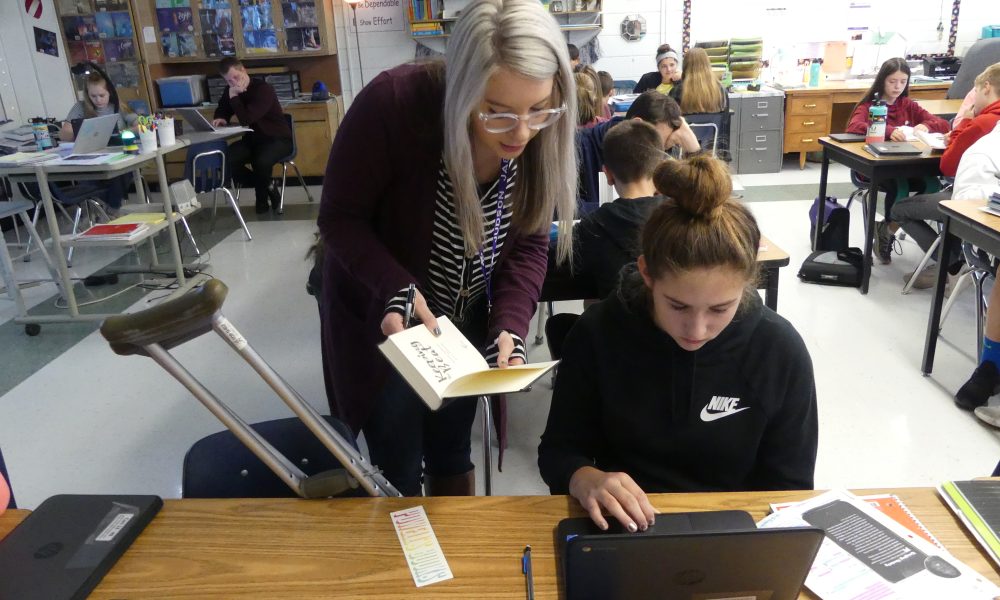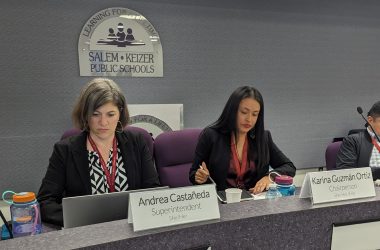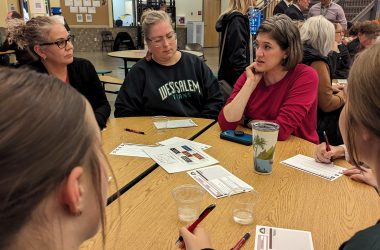
Kristin Micklewright helps a seventh-grader take a reading test on Oct. 30, 2018. (Rachel Alexander/Salem Reporter)
Parents, students and colleagues nominated 61 Salem-Keizer educators for Crystal Apple Awards this year. The award, given annually by the Salem-Keizer Education Foundation, recognizes staff who make a significant difference in the lives of children.
A dozen winners will be announced at an awards ceremony Thursday evening. Leading up to the event, Salem Reporter is profiling three teachers nominated by a parent or student.
“Don’t mutiny!” Kristin Micklewright told her students as she erased then re-wrote a sentence on the classroom projector.
She bantered with her students as she pushed them to work together, writing a paragraph analyzing a reading assignment.
Her seventh-grade language arts class had read an article on research showing students who had their phones taken away for an hour often fell asleep, suggesting they were more relaxed without a screen in front of them.
Micklewright could relate. She’s a busy Judson Middle School teacher who advises multiple student clubs, could relate.
“I feel like being phone-free sometimes would be very blissful,” she said to her first class of the day.
“For you, not for us!” one student shouted back.

Kristin Micklewright helps students write a paragraph describing text structure in seventh grade language arts on Oct. 30, 2018. (Rachel Alexander/Salem Reporter)
Her approach to teaching makes her one of just two Salem-Keizer teachers nominated for a Crystal Apple Award by a student. The student wrote that Micklewright is unique in recognizing and helping students work through barriers.
On a recent day, a lesson focused on training students to identify when an author is using a specific style like description or compare and contrast. Micklewright worked with her students to write a paragraph explaining how the article showed cause and effect.
“I love doing this because it’s tricky and new,” she said.
The goal, she said, is to gradually introduce them to backing up their thoughts with evidence and citing sources.
“Now that we’re in seventh grade, I don’t want you to say, ‘I think,’” she said. “I want you to be confident in your answers.”
Micklewright engages her students by bringing impactful topics into the classroom, she said. Her classes read about the stress effect of cell phones and head trauma in football. In humanities, they learned about refugees and researched a specific refugee’s case on the United Nations website.
Every spring, she has her students debate whether video games cause violent behavior. Students have to cite evidence to support their views.
“The kids go nuts over that topic. They write just incredible pieces,” she said.
Many of her students have special needs or disabilities, and her colleagues said she’s able to meet those students where they are and make class accessible to them.
“She is by far the best general education teacher that I have been in the classroom with,” said Bob Finicle, an instructional assistant who works in her classroom.
Finicle said nearly half the students in one of her classes have an individualized education plan, accommodating their special needs.
Her classroom style, which is quiet and ordered, helps students with attention deficit disorder focus, he said. She applied for a grant to get iPads so she can record readings for class, helping students who process information better audibly.
Micklewright is in her sixth year teaching, and her fifth in the Salem-Keizer district.
She went to school to be a certified nursing assistant, but found she didn’t like the long hours. Teaching isn’t known for short work days, but there are no overnight shifts, and more flexibility with the hours spent grading.
“At least I can do it at home in my PJs,” she said.
She wanted to teach elementary school, but was assigned to a sixth-grade classroom as a student teacher while studying at Western Oregon University. Surprisingly, she found she loved middle school, where students are still young enough to have fun, but old enough that they’re beginning to reason and question things.
“They have really good hearts,” she said of her students.

Kristin Micklewright talks with a student in seventh grade language arts on Oct. 30, 2018. (Rachel Alexander/Salem Reporter)
Though she’s a newer teacher, Micklewright has taken on leadership roles at Judson. She coordinates the school’s advisory periods, a weekly session where teachers talk with students about note taking and other study skills.
She’s also on the leadership team for Judson’s Advancement Via Individual Determination program, which supports students who want to go on to college but may face barriers by helping them develop academic and life skills to succeed.
“It’s not common to see somebody who’s so young be just such an integral part of the heart of our school,” said Rachel Young, Judson’s AVID coordinator.
Last year, Micklewright helped organize a banquet to celebrate AVID students. With a tiny budget, Micklewright created a special night by inviting district culinary students to set up food trucks and cater the event, giving them a chance to practice what they were learning.
Young said that Micklewright walks the line of being a mentor and sounding board for students while holding them to high standards, something newer teachers often struggle with.
“She just seems to know how to connect with kids and also create a space that is absolutely rigorous,” Young said.
Micklewright said she’s nervous about walking the red carpet at the Crystal Apple ceremony Thursday evening.
When she told the student who nominated her about disliking the attention, the student made a point.
“She said I pushed her out of her comfort zone, so now it’s my turn,” she said. It’s one of the reasons she likes middle school – students make you walk the walk.
“They do flip it around on you,” she said.
Reporter Rachel Alexander: [email protected] or 503-575-1241.









